Report on Talent Management Challenges in Oxford Business Collage
VerifiedAdded on 2023/06/17
|20
|3070
|436
Report
AI Summary
This report investigates the key challenges and obstacles facing the education sector in terms of talent management, with a specific focus on Oxford Business Collage. It includes a project management plan outlining milestones, costs, scope, quality, communication, risks, and resources, along with a Gantt chart and Work Breakdown Structure (WBS). The research employs both primary and secondary data, utilizing a deductive approach and positivism research philosophy. Primary data was collected through questionnaires and analyzed using frequency data analysis. The literature review identifies themes such as the importance of talent management in education, its role in employee recruitment and retention, the challenges faced, and potential solutions. Key challenges include high workloads, insufficient rewards, and recognition, while solutions involve developing effective reward systems and aligning organizational strategy with talent management practices. The report concludes that the education sector in the UK faces significant talent management challenges and recommends that firms address these issues to provide the best possible education to students. Desklib provides past papers and solved assignments for students.

1
Paraphrase This Document
Need a fresh take? Get an instant paraphrase of this document with our AI Paraphraser
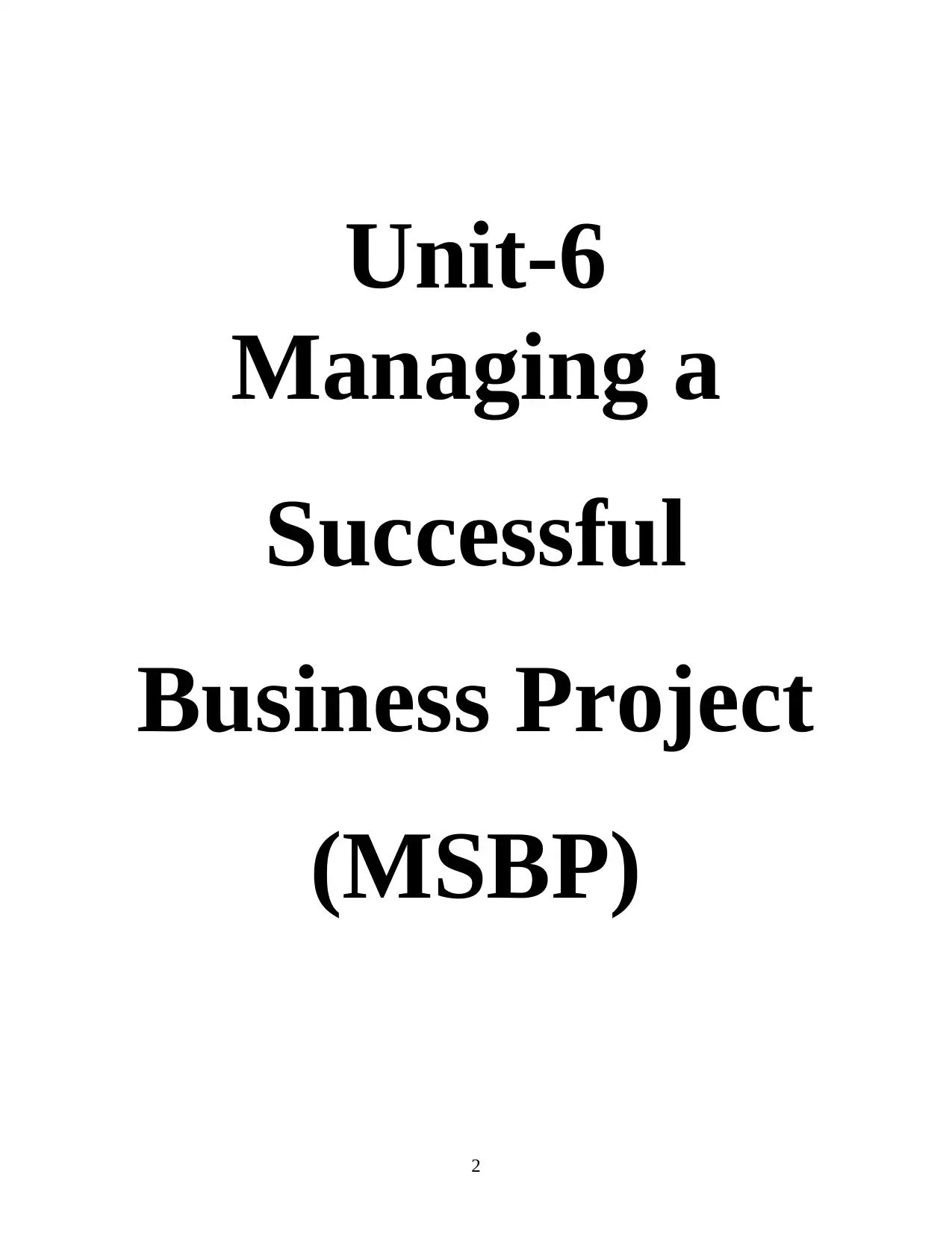
Unit-6
Managing a
Successful
Business Project
(MSBP)
2
Managing a
Successful
Business Project
(MSBP)
2
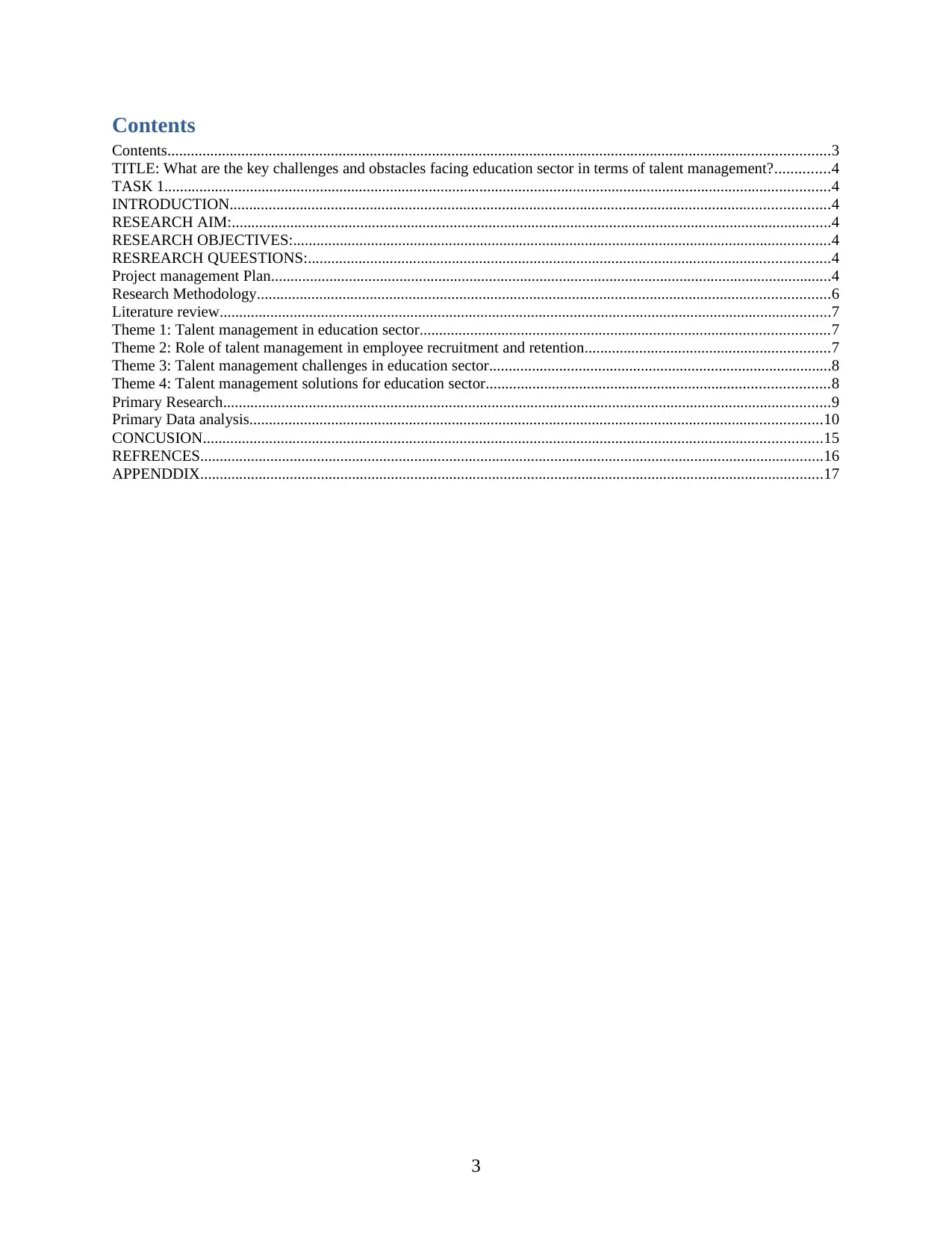
Contents
Contents..........................................................................................................................................................................3
TITLE: What are the key challenges and obstacles facing education sector in terms of talent management?..............4
TASK 1...........................................................................................................................................................................4
INTRODUCTION..........................................................................................................................................................4
RESEARCH AIM:..........................................................................................................................................................4
RESEARCH OBJECTIVES:..........................................................................................................................................4
RESREARCH QUEESTIONS:......................................................................................................................................4
Project management Plan................................................................................................................................................4
Research Methodology...................................................................................................................................................6
Literature review.............................................................................................................................................................7
Theme 1: Talent management in education sector.........................................................................................................7
Theme 2: Role of talent management in employee recruitment and retention...............................................................7
Theme 3: Talent management challenges in education sector........................................................................................8
Theme 4: Talent management solutions for education sector........................................................................................8
Primary Research............................................................................................................................................................9
Primary Data analysis...................................................................................................................................................10
CONCUSION...............................................................................................................................................................15
REFRENCES................................................................................................................................................................16
APPENDDIX................................................................................................................................................................17
3
Contents..........................................................................................................................................................................3
TITLE: What are the key challenges and obstacles facing education sector in terms of talent management?..............4
TASK 1...........................................................................................................................................................................4
INTRODUCTION..........................................................................................................................................................4
RESEARCH AIM:..........................................................................................................................................................4
RESEARCH OBJECTIVES:..........................................................................................................................................4
RESREARCH QUEESTIONS:......................................................................................................................................4
Project management Plan................................................................................................................................................4
Research Methodology...................................................................................................................................................6
Literature review.............................................................................................................................................................7
Theme 1: Talent management in education sector.........................................................................................................7
Theme 2: Role of talent management in employee recruitment and retention...............................................................7
Theme 3: Talent management challenges in education sector........................................................................................8
Theme 4: Talent management solutions for education sector........................................................................................8
Primary Research............................................................................................................................................................9
Primary Data analysis...................................................................................................................................................10
CONCUSION...............................................................................................................................................................15
REFRENCES................................................................................................................................................................16
APPENDDIX................................................................................................................................................................17
3
⊘ This is a preview!⊘
Do you want full access?
Subscribe today to unlock all pages.

Trusted by 1+ million students worldwide
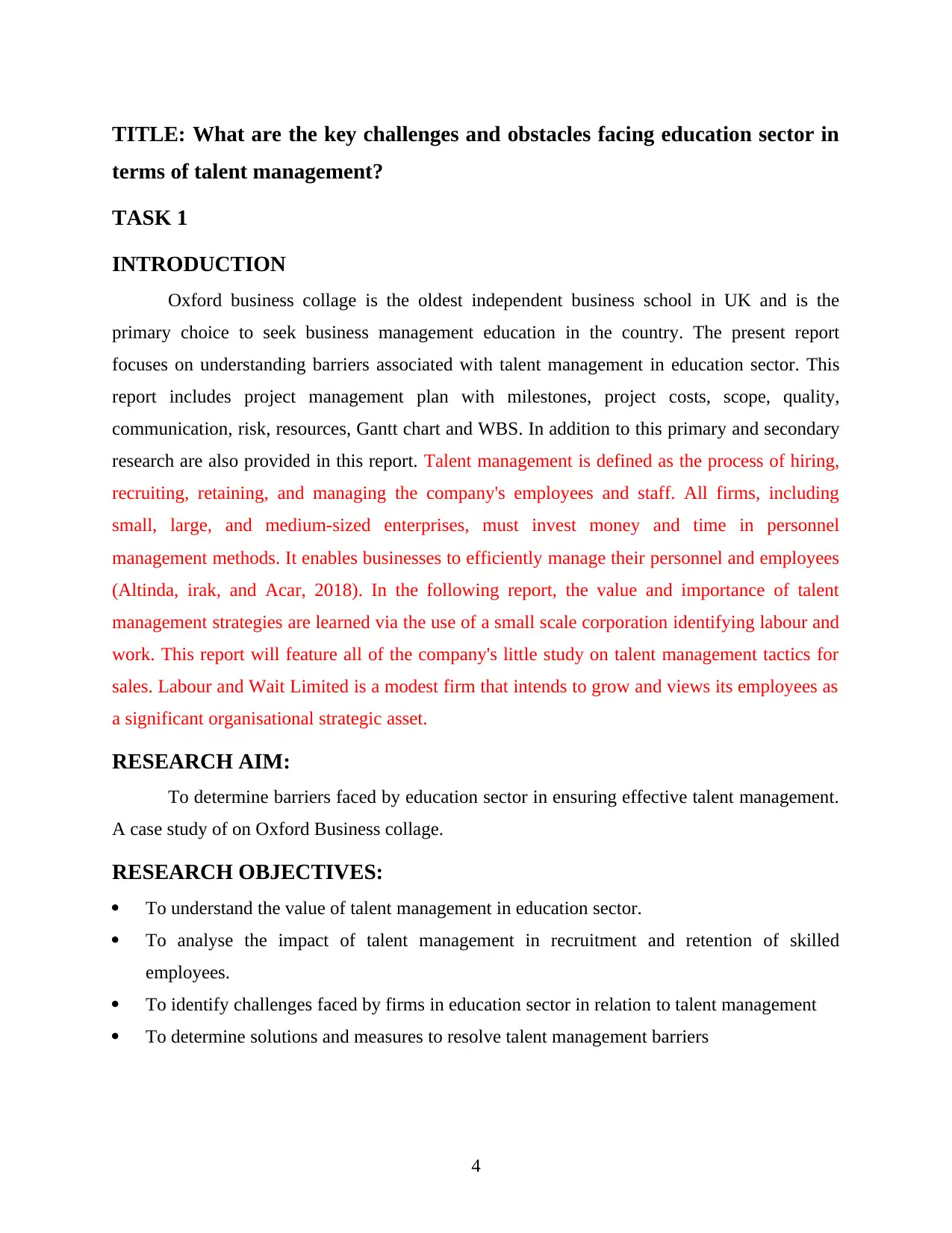
TITLE: What are the key challenges and obstacles facing education sector in
terms of talent management?
TASK 1
INTRODUCTION
Oxford business collage is the oldest independent business school in UK and is the
primary choice to seek business management education in the country. The present report
focuses on understanding barriers associated with talent management in education sector. This
report includes project management plan with milestones, project costs, scope, quality,
communication, risk, resources, Gantt chart and WBS. In addition to this primary and secondary
research are also provided in this report. Talent management is defined as the process of hiring,
recruiting, retaining, and managing the company's employees and staff. All firms, including
small, large, and medium-sized enterprises, must invest money and time in personnel
management methods. It enables businesses to efficiently manage their personnel and employees
(Altinda, irak, and Acar, 2018). In the following report, the value and importance of talent
management strategies are learned via the use of a small scale corporation identifying labour and
work. This report will feature all of the company's little study on talent management tactics for
sales. Labour and Wait Limited is a modest firm that intends to grow and views its employees as
a significant organisational strategic asset.
RESEARCH AIM:
To determine barriers faced by education sector in ensuring effective talent management.
A case study of on Oxford Business collage.
RESEARCH OBJECTIVES:
· To understand the value of talent management in education sector.
· To analyse the impact of talent management in recruitment and retention of skilled
employees.
· To identify challenges faced by firms in education sector in relation to talent management
· To determine solutions and measures to resolve talent management barriers
4
terms of talent management?
TASK 1
INTRODUCTION
Oxford business collage is the oldest independent business school in UK and is the
primary choice to seek business management education in the country. The present report
focuses on understanding barriers associated with talent management in education sector. This
report includes project management plan with milestones, project costs, scope, quality,
communication, risk, resources, Gantt chart and WBS. In addition to this primary and secondary
research are also provided in this report. Talent management is defined as the process of hiring,
recruiting, retaining, and managing the company's employees and staff. All firms, including
small, large, and medium-sized enterprises, must invest money and time in personnel
management methods. It enables businesses to efficiently manage their personnel and employees
(Altinda, irak, and Acar, 2018). In the following report, the value and importance of talent
management strategies are learned via the use of a small scale corporation identifying labour and
work. This report will feature all of the company's little study on talent management tactics for
sales. Labour and Wait Limited is a modest firm that intends to grow and views its employees as
a significant organisational strategic asset.
RESEARCH AIM:
To determine barriers faced by education sector in ensuring effective talent management.
A case study of on Oxford Business collage.
RESEARCH OBJECTIVES:
· To understand the value of talent management in education sector.
· To analyse the impact of talent management in recruitment and retention of skilled
employees.
· To identify challenges faced by firms in education sector in relation to talent management
· To determine solutions and measures to resolve talent management barriers
4
Paraphrase This Document
Need a fresh take? Get an instant paraphrase of this document with our AI Paraphraser
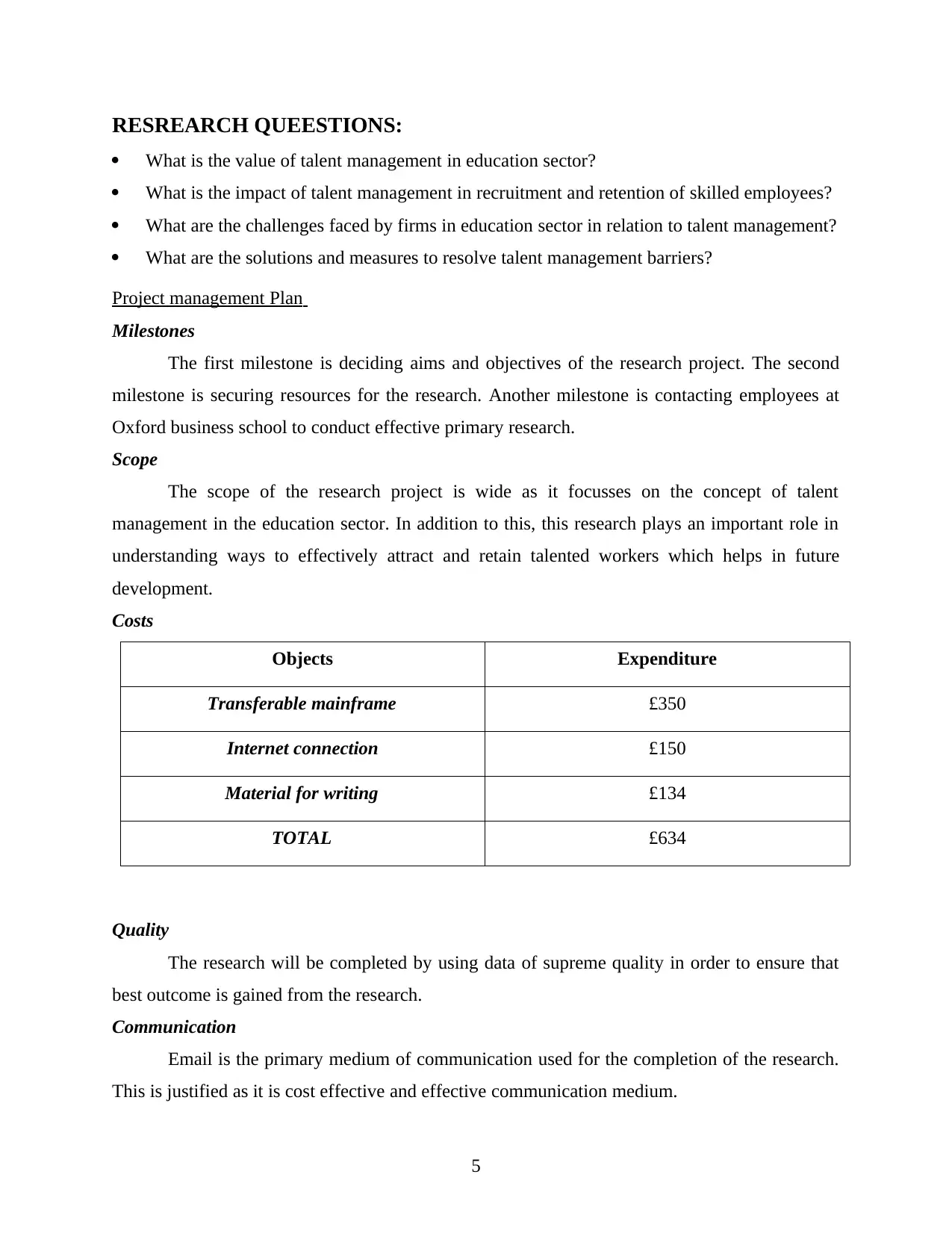
RESREARCH QUEESTIONS:
· What is the value of talent management in education sector?
· What is the impact of talent management in recruitment and retention of skilled employees?
· What are the challenges faced by firms in education sector in relation to talent management?
· What are the solutions and measures to resolve talent management barriers?
Project management Plan
Milestones
The first milestone is deciding aims and objectives of the research project. The second
milestone is securing resources for the research. Another milestone is contacting employees at
Oxford business school to conduct effective primary research.
Scope
The scope of the research project is wide as it focusses on the concept of talent
management in the education sector. In addition to this, this research plays an important role in
understanding ways to effectively attract and retain talented workers which helps in future
development.
Costs
Objects Expenditure
Transferable mainframe £350
Internet connection £150
Material for writing £134
TOTAL £634
Quality
The research will be completed by using data of supreme quality in order to ensure that
best outcome is gained from the research.
Communication
Email is the primary medium of communication used for the completion of the research.
This is justified as it is cost effective and effective communication medium.
5
· What is the value of talent management in education sector?
· What is the impact of talent management in recruitment and retention of skilled employees?
· What are the challenges faced by firms in education sector in relation to talent management?
· What are the solutions and measures to resolve talent management barriers?
Project management Plan
Milestones
The first milestone is deciding aims and objectives of the research project. The second
milestone is securing resources for the research. Another milestone is contacting employees at
Oxford business school to conduct effective primary research.
Scope
The scope of the research project is wide as it focusses on the concept of talent
management in the education sector. In addition to this, this research plays an important role in
understanding ways to effectively attract and retain talented workers which helps in future
development.
Costs
Objects Expenditure
Transferable mainframe £350
Internet connection £150
Material for writing £134
TOTAL £634
Quality
The research will be completed by using data of supreme quality in order to ensure that
best outcome is gained from the research.
Communication
Email is the primary medium of communication used for the completion of the research.
This is justified as it is cost effective and effective communication medium.
5
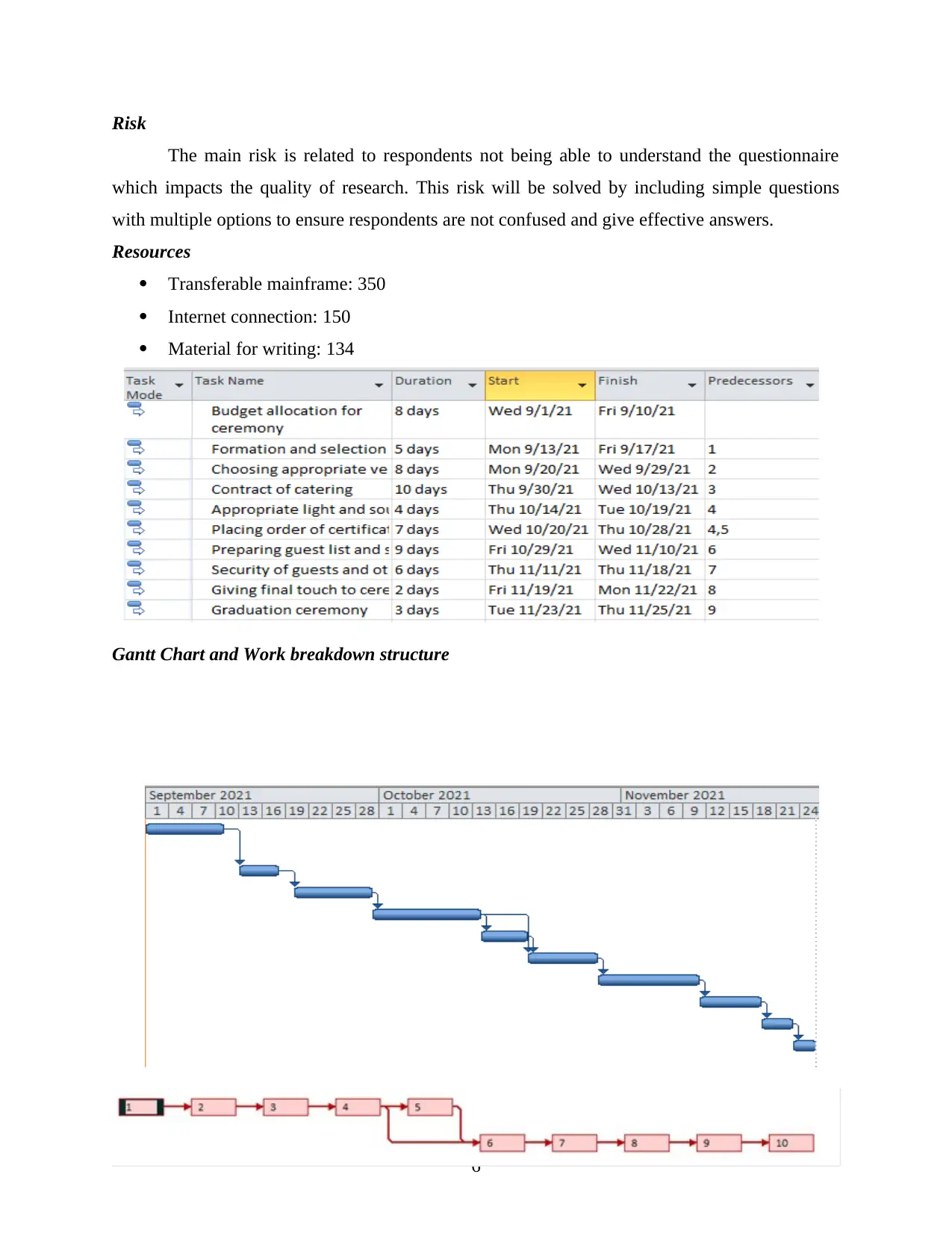
Risk
The main risk is related to respondents not being able to understand the questionnaire
which impacts the quality of research. This risk will be solved by including simple questions
with multiple options to ensure respondents are not confused and give effective answers.
Resources
· Transferable mainframe: 350
· Internet connection: 150
· Material for writing: 134
Gantt Chart and Work breakdown structure
Work breakdown structure
6
The main risk is related to respondents not being able to understand the questionnaire
which impacts the quality of research. This risk will be solved by including simple questions
with multiple options to ensure respondents are not confused and give effective answers.
Resources
· Transferable mainframe: 350
· Internet connection: 150
· Material for writing: 134
Gantt Chart and Work breakdown structure
Work breakdown structure
6
⊘ This is a preview!⊘
Do you want full access?
Subscribe today to unlock all pages.

Trusted by 1+ million students worldwide
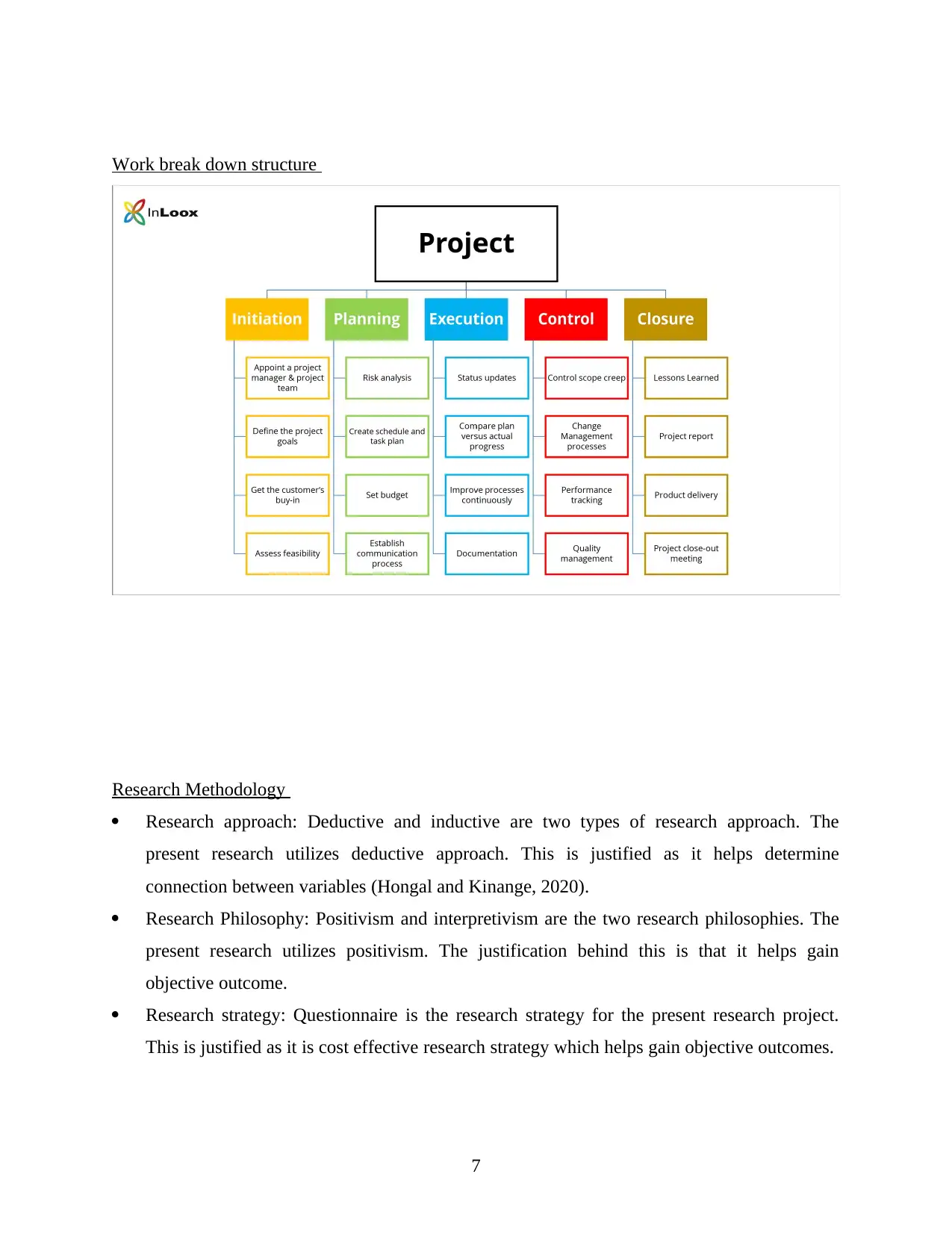
Work break down structure
Research Methodology
· Research approach: Deductive and inductive are two types of research approach. The
present research utilizes deductive approach. This is justified as it helps determine
connection between variables (Hongal and Kinange, 2020).
· Research Philosophy: Positivism and interpretivism are the two research philosophies. The
present research utilizes positivism. The justification behind this is that it helps gain
objective outcome.
· Research strategy: Questionnaire is the research strategy for the present research project.
This is justified as it is cost effective research strategy which helps gain objective outcomes.
7
Research Methodology
· Research approach: Deductive and inductive are two types of research approach. The
present research utilizes deductive approach. This is justified as it helps determine
connection between variables (Hongal and Kinange, 2020).
· Research Philosophy: Positivism and interpretivism are the two research philosophies. The
present research utilizes positivism. The justification behind this is that it helps gain
objective outcome.
· Research strategy: Questionnaire is the research strategy for the present research project.
This is justified as it is cost effective research strategy which helps gain objective outcomes.
7
Paraphrase This Document
Need a fresh take? Get an instant paraphrase of this document with our AI Paraphraser
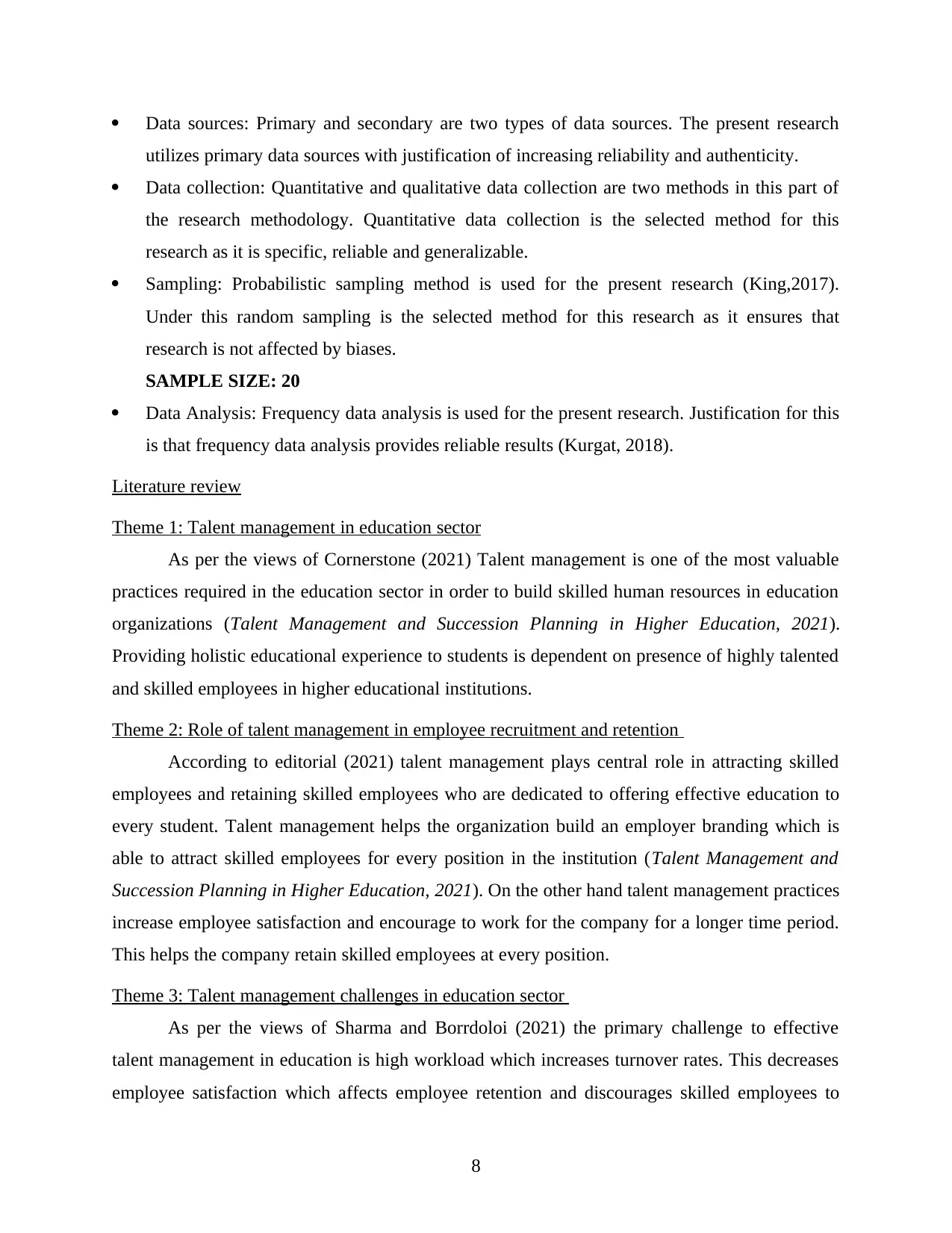
· Data sources: Primary and secondary are two types of data sources. The present research
utilizes primary data sources with justification of increasing reliability and authenticity.
· Data collection: Quantitative and qualitative data collection are two methods in this part of
the research methodology. Quantitative data collection is the selected method for this
research as it is specific, reliable and generalizable.
· Sampling: Probabilistic sampling method is used for the present research (King,2017).
Under this random sampling is the selected method for this research as it ensures that
research is not affected by biases.
SAMPLE SIZE: 20
· Data Analysis: Frequency data analysis is used for the present research. Justification for this
is that frequency data analysis provides reliable results (Kurgat, 2018).
Literature review
Theme 1: Talent management in education sector
As per the views of Cornerstone (2021) Talent management is one of the most valuable
practices required in the education sector in order to build skilled human resources in education
organizations (Talent Management and Succession Planning in Higher Education, 2021).
Providing holistic educational experience to students is dependent on presence of highly talented
and skilled employees in higher educational institutions.
Theme 2: Role of talent management in employee recruitment and retention
According to editorial (2021) talent management plays central role in attracting skilled
employees and retaining skilled employees who are dedicated to offering effective education to
every student. Talent management helps the organization build an employer branding which is
able to attract skilled employees for every position in the institution (Talent Management and
Succession Planning in Higher Education, 2021). On the other hand talent management practices
increase employee satisfaction and encourage to work for the company for a longer time period.
This helps the company retain skilled employees at every position.
Theme 3: Talent management challenges in education sector
As per the views of Sharma and Borrdoloi (2021) the primary challenge to effective
talent management in education is high workload which increases turnover rates. This decreases
employee satisfaction which affects employee retention and discourages skilled employees to
8
utilizes primary data sources with justification of increasing reliability and authenticity.
· Data collection: Quantitative and qualitative data collection are two methods in this part of
the research methodology. Quantitative data collection is the selected method for this
research as it is specific, reliable and generalizable.
· Sampling: Probabilistic sampling method is used for the present research (King,2017).
Under this random sampling is the selected method for this research as it ensures that
research is not affected by biases.
SAMPLE SIZE: 20
· Data Analysis: Frequency data analysis is used for the present research. Justification for this
is that frequency data analysis provides reliable results (Kurgat, 2018).
Literature review
Theme 1: Talent management in education sector
As per the views of Cornerstone (2021) Talent management is one of the most valuable
practices required in the education sector in order to build skilled human resources in education
organizations (Talent Management and Succession Planning in Higher Education, 2021).
Providing holistic educational experience to students is dependent on presence of highly talented
and skilled employees in higher educational institutions.
Theme 2: Role of talent management in employee recruitment and retention
According to editorial (2021) talent management plays central role in attracting skilled
employees and retaining skilled employees who are dedicated to offering effective education to
every student. Talent management helps the organization build an employer branding which is
able to attract skilled employees for every position in the institution (Talent Management and
Succession Planning in Higher Education, 2021). On the other hand talent management practices
increase employee satisfaction and encourage to work for the company for a longer time period.
This helps the company retain skilled employees at every position.
Theme 3: Talent management challenges in education sector
As per the views of Sharma and Borrdoloi (2021) the primary challenge to effective
talent management in education is high workload which increases turnover rates. This decreases
employee satisfaction which affects employee retention and discourages skilled employees to
8
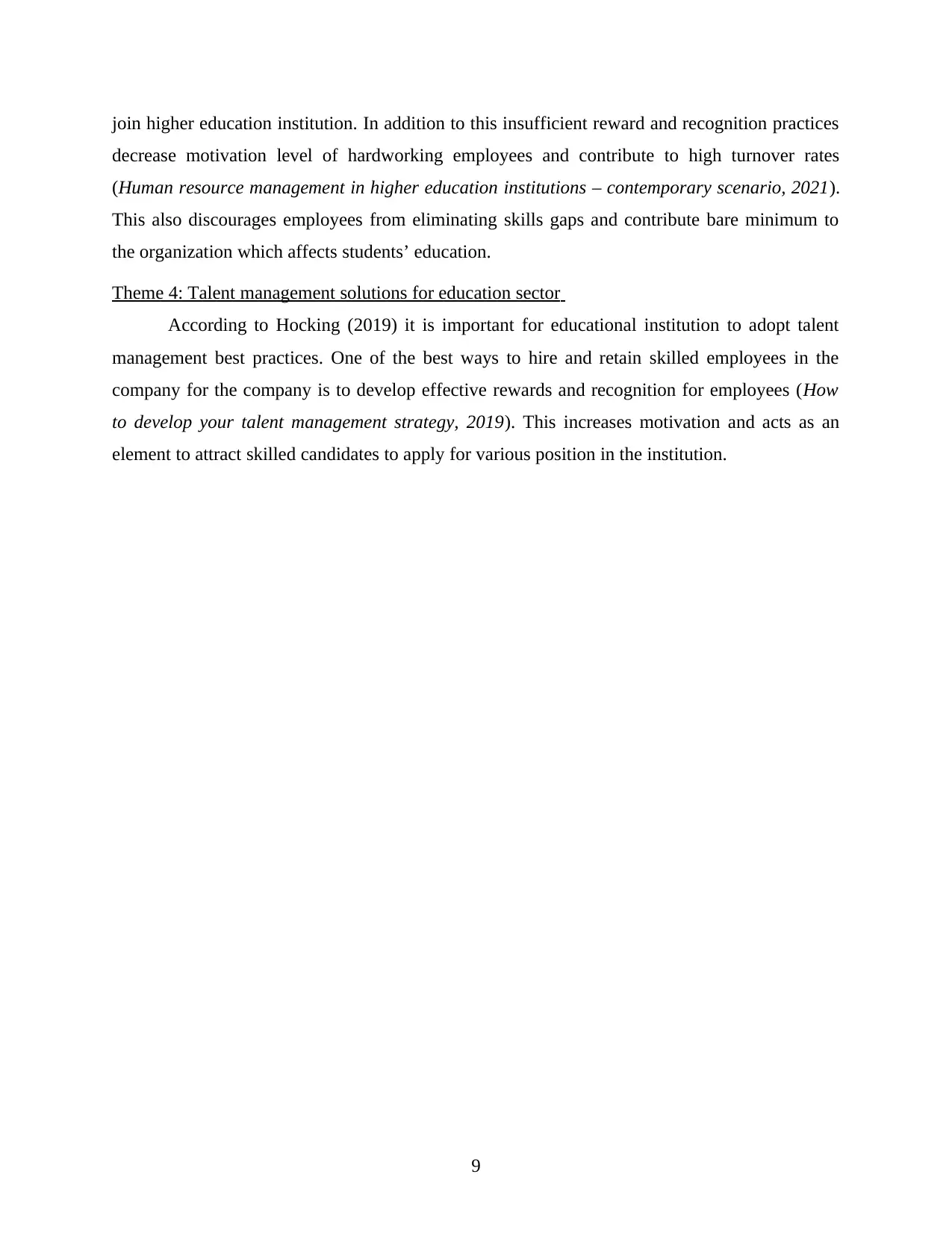
join higher education institution. In addition to this insufficient reward and recognition practices
decrease motivation level of hardworking employees and contribute to high turnover rates
(Human resource management in higher education institutions – contemporary scenario, 2021).
This also discourages employees from eliminating skills gaps and contribute bare minimum to
the organization which affects students’ education.
Theme 4: Talent management solutions for education sector
According to Hocking (2019) it is important for educational institution to adopt talent
management best practices. One of the best ways to hire and retain skilled employees in the
company for the company is to develop effective rewards and recognition for employees (How
to develop your talent management strategy, 2019). This increases motivation and acts as an
element to attract skilled candidates to apply for various position in the institution.
9
decrease motivation level of hardworking employees and contribute to high turnover rates
(Human resource management in higher education institutions – contemporary scenario, 2021).
This also discourages employees from eliminating skills gaps and contribute bare minimum to
the organization which affects students’ education.
Theme 4: Talent management solutions for education sector
According to Hocking (2019) it is important for educational institution to adopt talent
management best practices. One of the best ways to hire and retain skilled employees in the
company for the company is to develop effective rewards and recognition for employees (How
to develop your talent management strategy, 2019). This increases motivation and acts as an
element to attract skilled candidates to apply for various position in the institution.
9
⊘ This is a preview!⊘
Do you want full access?
Subscribe today to unlock all pages.

Trusted by 1+ million students worldwide
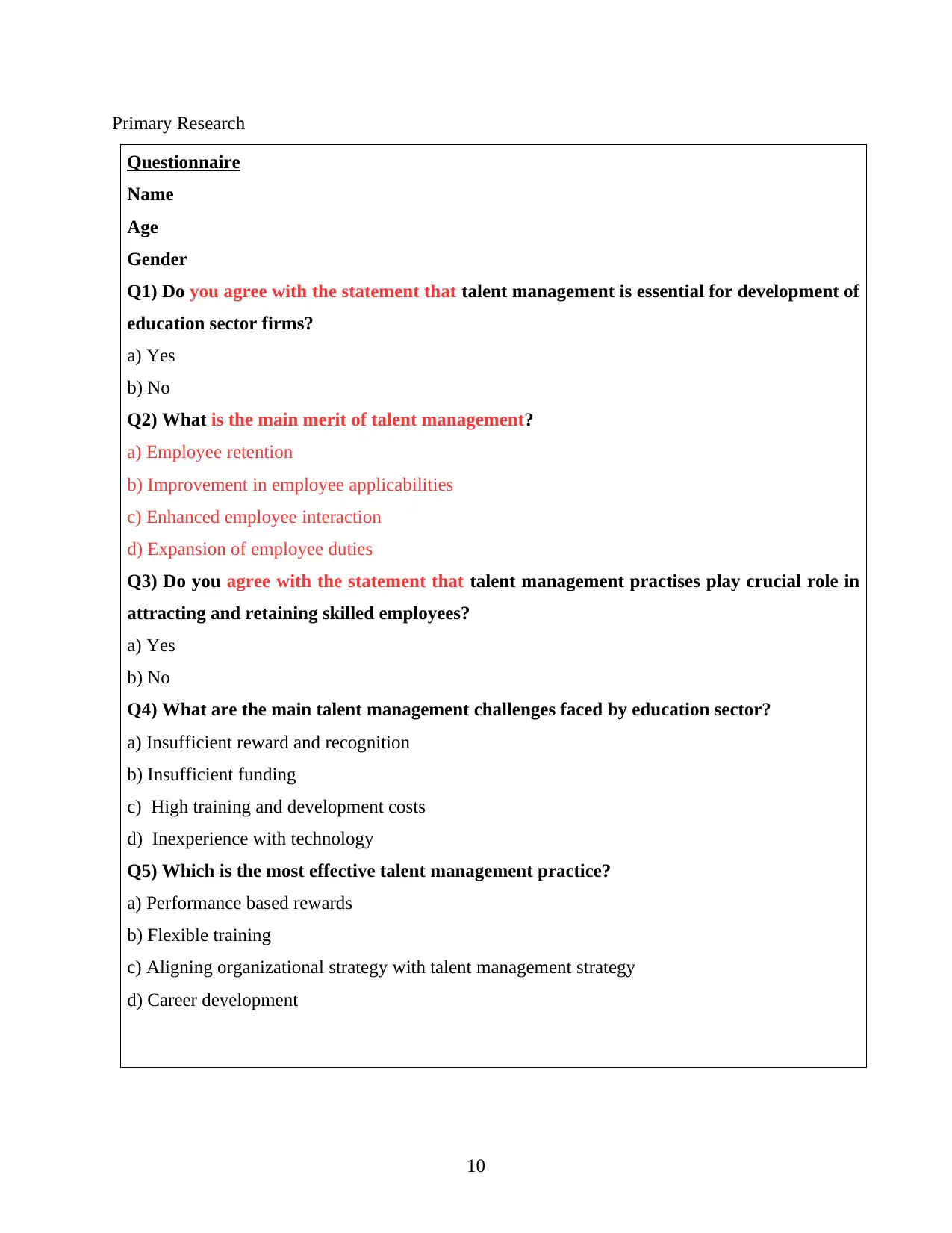
Primary Research
Questionnaire
Name
Age
Gender
Q1) Do you agree with the statement that talent management is essential for development of
education sector firms?
a) Yes
b) No
Q2) What is the main merit of talent management?
a) Employee retention
b) Improvement in employee applicabilities
c) Enhanced employee interaction
d) Expansion of employee duties
Q3) Do you agree with the statement that talent management practises play crucial role in
attracting and retaining skilled employees?
a) Yes
b) No
Q4) What are the main talent management challenges faced by education sector?
a) Insufficient reward and recognition
b) Insufficient funding
c) High training and development costs
d) Inexperience with technology
Q5) Which is the most effective talent management practice?
a) Performance based rewards
b) Flexible training
c) Aligning organizational strategy with talent management strategy
d) Career development
10
Questionnaire
Name
Age
Gender
Q1) Do you agree with the statement that talent management is essential for development of
education sector firms?
a) Yes
b) No
Q2) What is the main merit of talent management?
a) Employee retention
b) Improvement in employee applicabilities
c) Enhanced employee interaction
d) Expansion of employee duties
Q3) Do you agree with the statement that talent management practises play crucial role in
attracting and retaining skilled employees?
a) Yes
b) No
Q4) What are the main talent management challenges faced by education sector?
a) Insufficient reward and recognition
b) Insufficient funding
c) High training and development costs
d) Inexperience with technology
Q5) Which is the most effective talent management practice?
a) Performance based rewards
b) Flexible training
c) Aligning organizational strategy with talent management strategy
d) Career development
10
Paraphrase This Document
Need a fresh take? Get an instant paraphrase of this document with our AI Paraphraser
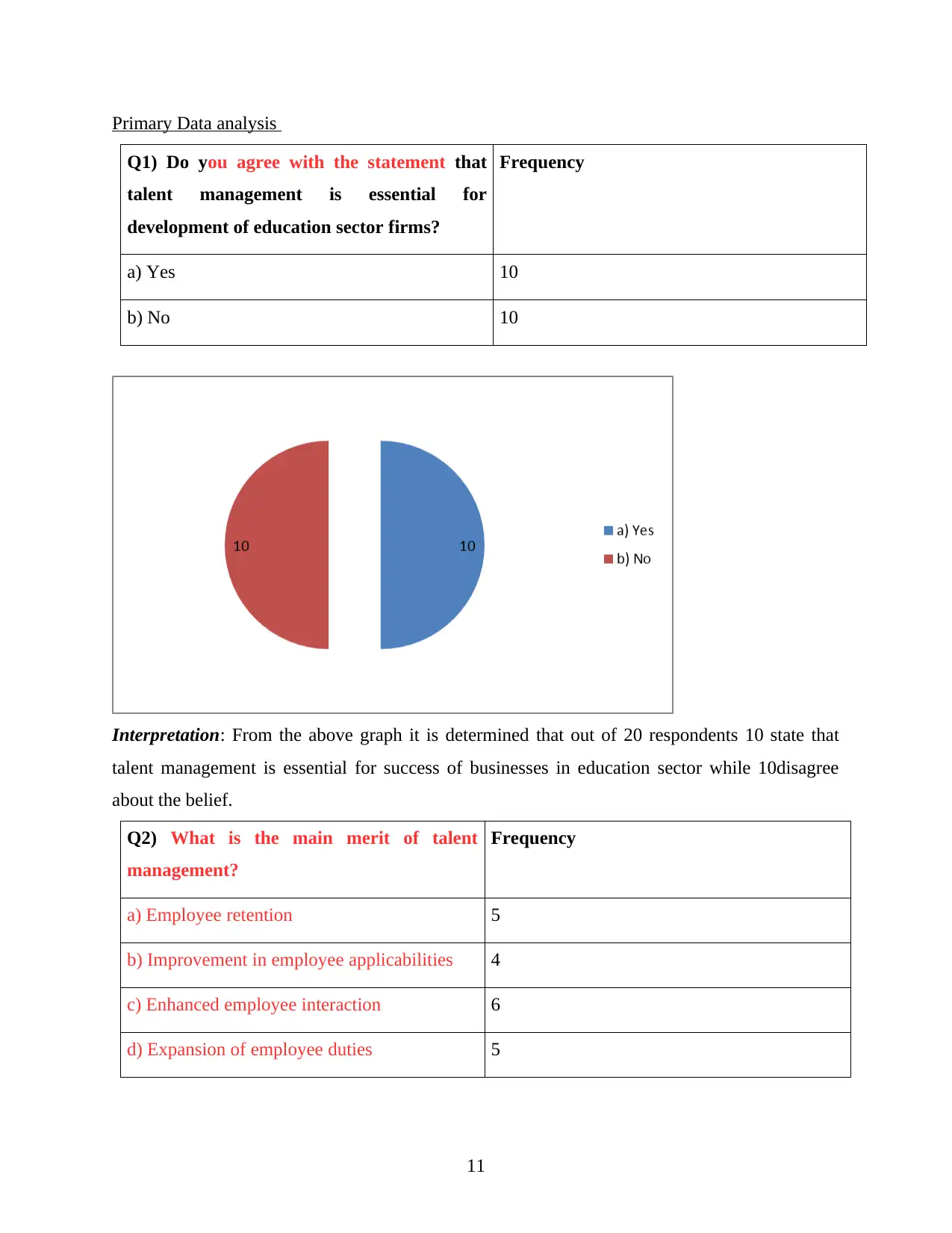
Primary Data analysis
Q1) Do you agree with the statement that
talent management is essential for
development of education sector firms?
Frequency
a) Yes 10
b) No 10
Interpretation: From the above graph it is determined that out of 20 respondents 10 state that
talent management is essential for success of businesses in education sector while 10disagree
about the belief.
Q2) What is the main merit of talent
management?
Frequency
a) Employee retention 5
b) Improvement in employee applicabilities 4
c) Enhanced employee interaction 6
d) Expansion of employee duties 5
11
Q1) Do you agree with the statement that
talent management is essential for
development of education sector firms?
Frequency
a) Yes 10
b) No 10
Interpretation: From the above graph it is determined that out of 20 respondents 10 state that
talent management is essential for success of businesses in education sector while 10disagree
about the belief.
Q2) What is the main merit of talent
management?
Frequency
a) Employee retention 5
b) Improvement in employee applicabilities 4
c) Enhanced employee interaction 6
d) Expansion of employee duties 5
11
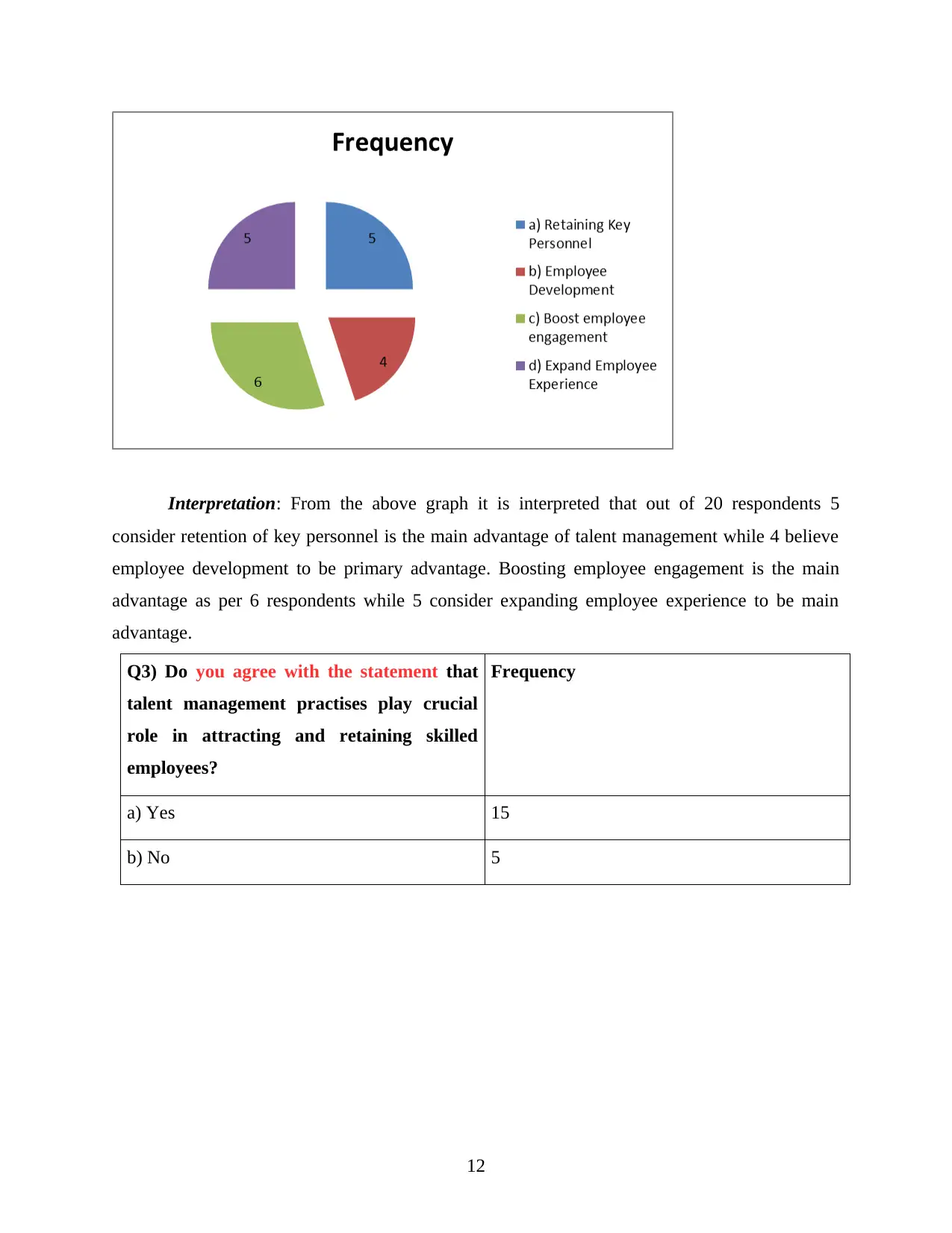
Interpretation: From the above graph it is interpreted that out of 20 respondents 5
consider retention of key personnel is the main advantage of talent management while 4 believe
employee development to be primary advantage. Boosting employee engagement is the main
advantage as per 6 respondents while 5 consider expanding employee experience to be main
advantage.
Q3) Do you agree with the statement that
talent management practises play crucial
role in attracting and retaining skilled
employees?
Frequency
a) Yes 15
b) No 5
12
consider retention of key personnel is the main advantage of talent management while 4 believe
employee development to be primary advantage. Boosting employee engagement is the main
advantage as per 6 respondents while 5 consider expanding employee experience to be main
advantage.
Q3) Do you agree with the statement that
talent management practises play crucial
role in attracting and retaining skilled
employees?
Frequency
a) Yes 15
b) No 5
12
⊘ This is a preview!⊘
Do you want full access?
Subscribe today to unlock all pages.

Trusted by 1+ million students worldwide
1 out of 20
Related Documents
Your All-in-One AI-Powered Toolkit for Academic Success.
+13062052269
info@desklib.com
Available 24*7 on WhatsApp / Email
![[object Object]](/_next/static/media/star-bottom.7253800d.svg)
Unlock your academic potential
Copyright © 2020–2026 A2Z Services. All Rights Reserved. Developed and managed by ZUCOL.





